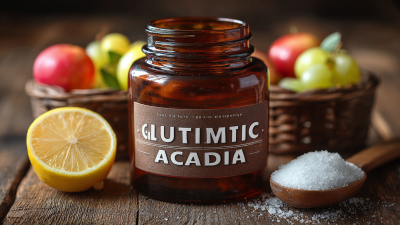7 Best Ways Glutamic Acid Can Boost Your Health and Wellbeing
Glutamic Acid, a non-essential amino acid, plays a pivotal role in numerous physiological processes beyond its function as a building block for proteins. According to a study published in the Journal of Nutrition, glutamic acid is vital for neurotransmission, acting as a key excitatory neurotransmitter in the brain, which underscores its importance in cognitive function and mental health (Journal of Nutrition, 2021). Furthermore, research by the International Society for Amino Acids highlights glutamic acid's potential in improving athletic performance and recovery by enhancing protein synthesis and reducing muscle fatigue. With an increasing body of evidence supporting its benefits, such as immune system enhancement and improved gut health, exploring the myriad ways glutamic acid can boost health and wellbeing is essential for those seeking to optimize their physical and mental performance. This blog will delve into the seven best ways glutamic acid can contribute to overall health and wellbeing.

The Role of Glutamic Acid in Brain Function and Cognition
Glutamic acid plays a vital role in brain function and cognition, acting as a key neurotransmitter that facilitates communication between neurons. By enhancing synaptic plasticity, glutamic acid supports learning and memory processes, making it essential for cognitive health. Research has shown that adequate levels of glutamic acid can improve brain performance, potentially aiding those with cognitive impairments or degenerative diseases.
To harness the cognitive benefits of glutamic acid, consider incorporating foods rich in this amino acid into your diet. Foods such as tomatoes, cheese, and mushrooms are excellent sources. Additionally, it's important to maintain a balanced diet that encourages optimal neurotransmitter function. Regular physical exercise can also boost glutamate levels, promoting better brain health and cognitive clarity.
Another tip is to manage stress effectively, as chronic stress can lead to imbalances in glutamate levels, negatively affecting cognition. Practices such as mindfulness, meditation, or yoga can help in maintaining emotional stability, which further contributes to cognitive functioning. By investing in these habits, you can enhance not only your mental agility but your overall wellbeing.

Exploring the Benefits of Glutamic Acid for Muscle Recovery and Performance
Glutamic acid, a non-essential amino acid, plays a vital role in muscle recovery and athletic performance. Its ability to enhance protein synthesis and reduce muscle soreness makes it a popular choice among athletes and fitness enthusiasts. By increasing the production of growth hormone, glutamic acid aids in muscle repair, allowing for quicker recovery times post-exercise. This means you can train harder and more frequently without the prolonged fatigue.
To harness the benefits of glutamic acid, consider incorporating foods rich in this amino acid into your diet. Sources like fish, eggs, and certain vegetables can provide a natural boost. Additionally, supplementation with glutamine, often derived from glutamic acid, may further enhance recovery when taken post-workout.
Another effective tip for utilizing glutamic acid is to time your intake strategically. Consuming foods high in glutamic acid around your workout sessions can optimize recovery. For best results, pair your intake with carbohydrates to aid in muscle recovery. This not only replenishes glycogen stores but also improves the efficiency of amino acid uptake, ensuring your muscles receive the necessary nutrients to repair and grow stronger.
How Glutamic Acid Supports Digestive Health and Nutrient Absorption
Glutamic acid, a vital amino acid, plays a significant role in supporting digestive health and enhancing nutrient absorption. As a key component of proteins, it is essential for the synthesis of neurotransmitters and maintains the health of the gastrointestinal tract. A study published in the "Journal of Nutrition" reported that glutamic acid acts as a substrate for intestinal epithelial cells, promoting their growth and function. This improvement in gut barrier integrity can help prevent conditions such as leaky gut syndrome, which can impair nutrient absorption and lead to broader health issues.
Moreover, glutamic acid contributes to the production of important digestive enzymes. According to research from the "American Journal of Clinical Nutrition," adequate levels of glutamic acid can facilitate the secretion of digestive juices, thereby improving the breakdown of food and the absorption of essential nutrients. This enhanced digestive capability not only ensures that the body receives the necessary vitamins and minerals but also promotes overall well-being. With a better-functioning digestive system, individuals may experience fewer gastrointestinal disturbances, leading to improved quality of life and enhanced energy levels throughout the day.
7 Best Ways Glutamic Acid Can Boost Your Health and Wellbeing
Enhancing Mood and Stress Relief: The Impact of Glutamic Acid on Mental Wellbeing
Glutamic acid, a crucial amino acid, plays a significant role in enhancing mood and alleviating stress, making it an essential component of mental wellbeing. It acts as a neurotransmitter in the brain, facilitating communication between nerve cells. This process is vital for regulating emotions and cognitive functions. When glutamic acid levels are balanced, individuals often experience improved mood stability and reduced anxiety, fostering a sense of calm and focus.
One of the primary ways glutamic acid contributes to mental wellbeing is by promoting the production of gamma-aminobutyric acid (GABA), a neurotransmitter that inhibits excessive neural activity. Increased GABA levels can lead to relaxation and a reduction in stress responses, creating a more serene mental state. Moreover, glutamic acid aids in the synthesis of other neurotransmitters, such as serotonin and dopamine, which are crucial for feelings of happiness and contentment. By ensuring an adequate intake of glutamic acid through diet or supplementation, individuals can support their mental health, enhance their resilience against stress, and improve overall emotional wellbeing.
7 Best Ways Glutamic Acid Can Boost Your Health and Wellbeing
| Health Benefit | Description | Research Findings |
|---|---|---|
| Mood Enhancement | Glutamic acid plays a role in synthesizing neurotransmitters that improve mood. | Studies have shown a positive correlation between glutamic acid levels and mood stability. |
| Stress Relief | It can help reduce cortisol levels, the hormone associated with stress. | Research indicates lower cortisol in individuals with higher glutamic acid intake. |
| Cognitive Function | Supports brain health and memory through neurotransmitter function. | Evidence supports that it enhances memory recall and processing speed. |
| Neuroprotection | May protect neurons from damage and degeneration. | Animal studies suggest neuroprotective effects of glutamic acid. |
| Energy Boost | Assists in energy metabolism, promoting endurance and stamina. | Participants show improved physical performance with adequate glutamic acid. |
| Sleep Quality | May improve sleep quality by modulating sleep-regulating neurotransmitters. | Some research highlights better sleep patterns with increased intake. |
| Gut Health | Supports gut function and may contribute to a balanced microbiome. | Studies link glutamic acid with improved gut health and digestion. |
Natural Sources of Glutamic Acid: Best Foods to Include in Your Diet
 Glutamic acid, an amino acid that plays a vital role in various bodily functions, can be easily incorporated into your diet through natural food sources. Rich in protein, glutamic acid is found abundantly in foods such as meat, fish, and dairy products. For those looking to boost their health and well-being, including lean meats like chicken and turkey, as well as fish such as salmon and tuna, can provide a significant amount of this beneficial amino acid.
Glutamic acid, an amino acid that plays a vital role in various bodily functions, can be easily incorporated into your diet through natural food sources. Rich in protein, glutamic acid is found abundantly in foods such as meat, fish, and dairy products. For those looking to boost their health and well-being, including lean meats like chicken and turkey, as well as fish such as salmon and tuna, can provide a significant amount of this beneficial amino acid.
In addition to animal products, glutamic acid is also present in plant-based foods, offering options for vegetarians and vegans. Foods such as soy products, legumes, and certain nuts are great sources. Notably, fermented foods like miso and kimchi not only contribute glutamic acid but also promote gut health, enhancing overall well-being. By diversifying your diet with these nutrient-dense foods, you can harness the health benefits of glutamic acid while enjoying delicious meals that support your body’s functions.
Related Posts
-

Navigating the Global Market for Best Glutamic Acid Ultimate Guide to Finding Quality Suppliers
-

5 Key Benefits of Glutamic Acid in Food and Health Industries
-

Experience Reliable Quality: Best Propylene Glycol from China for Global Buyers
-

Unlocking the Advantages of Ferulic Acid for Innovative Global Supply Chain Solutions
-

Navigating Import-Export Certifications for Best Tylosin Phosphate: A Comprehensive Guide
-

Revolutionizing Nutrition: Industry Applications of Best Vitamin C Coated Supplements and Their Efficacy





